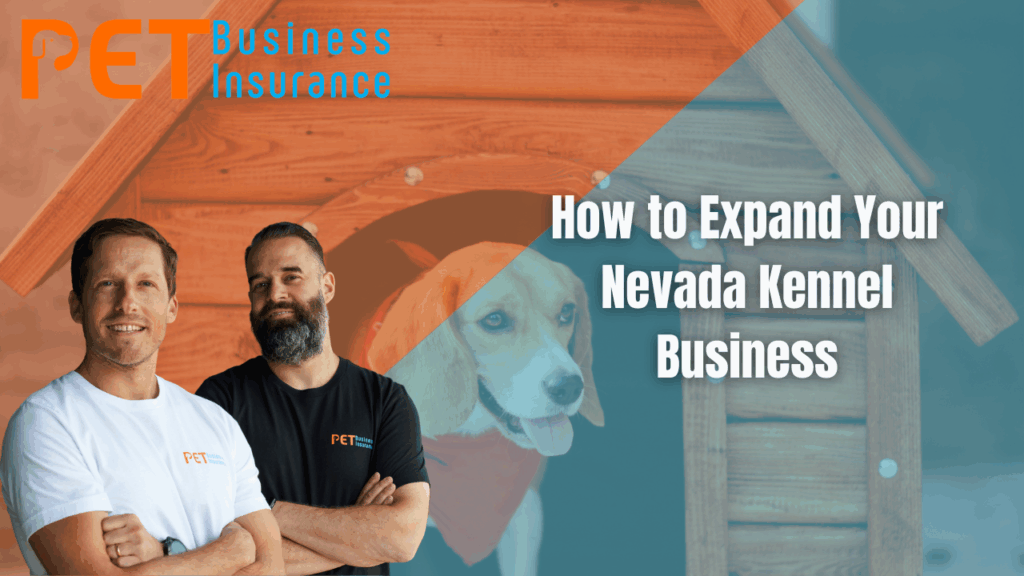
Is your Nevada kennel at capacity and you’re wondering if it’s time to open a second location? Worried that expansion could stretch your team too thin or leave your business exposed to new risks?
This guide will show you how to grow your kennel business with confidence. You’ll learn how to navigate Nevada’s regulatory terrain, overcome climate-related challenges, and implement operational strategies that maintain consistency across multiple locations. Most importantly, we will explain why specialized insurance is not optional; it is your safeguard during growth.
Here is what we will cover:
- Nevada market dynamics and expansion opportunities
- State and county regulations you must know
- Climate risks and how to design facilities accordingly
- Operational best practices for multi-location management
- Insurance essentials for kennel businesses
- Real-world expansion scenarios with cost estimates
Why Nevada Is a Prime Location for Pet Care Business Expansion
Nevada’s pet population is booming, particularly in metro hubs like Las Vegas and Reno. This is not just a national trend mirrored locally; it is supercharged by rapid population growth and shifting cultural norms. Pets are increasingly seen as family members, and owners are prioritizing quality care.
For kennel operators, this creates a dual opportunity: tap into high demand while differentiating with premium services. The most successful kennels cater to this evolved pet parent by offering luxury boarding, enrichment activities, and medically informed grooming or training options.
Know the Rules: Kennel Regulations in Nevada
Before you open another location, be crystal clear on the regulatory landscape. Nevada defines a kennel as any location that boards or breeds 10 or more dogs (6 months or older), but each county has its own permitting requirements.
Here are key differences:
| Location | Governing Body | Key Permits | Annual Fees |
|---|---|---|---|
| Clark County | Animal Protection Services | Breeder, Show, Pet Fancier | Varies by type |
| Washoe County | Regional Animal Services | Commercial Animal Welfare Permit | Not listed |
| Henderson | Police Department | Fancier, Breeder, Handler, Establishment | $50 to $200/year |
Beyond licenses, expect requirements like microchipping, rabies proof, animal limits, and site inspections. Do not underestimate this step; permits can delay opening by months if mishandled.
Building Facilities That Beat Nevada’s Climate
Heatstroke, dehydration, and air quality are real threats in the Nevada climate. Your facilities need more than fans and shaded patios.
Smart design features include:
- Fully climate-controlled indoor spaces
- Outdoor runs with misting systems
- Ventilation systems with HEPA filters
- Heat-absorbent flooring
- Scheduled playtimes during cooler hours
In northern regions like Reno, prepare for winter extremes too. Heated indoor zones and insulated sleeping areas are a must.
Scaling Smart: Multi-Location Operational Strategies
Expansion without standardization is a recipe for brand confusion. Ensure every location offers the same quality by systematizing your operations.
Start with:
- Centralized marketing: Maintain a consistent brand across locations
- Standard operating procedures: For check-ins, cleaning, feeding, and enrichment
- Unified software: Bookings, records, payroll, and inventory in one place
- Staff training and culture: Onboarding programs and ongoing education
Hold weekly manager meetings across locations and reward performance to create buy-in.
Why Your Insurance Must Evolve with Your Growth
Standard business policies will not cut it. As you scale, so do your risks. Animal injuries, staff accidents, property damage, even allergy reactions—you need industry-specific coverage.
At minimum, your kennel insurance should include:
- General Liability: Third-party injury or property damage
- Animal Bailee: If a pet is injured, lost, or dies in your care
- Veterinarian Reimbursement: For on-site illness or injury
- Commercial Property: Equipment, buildings, fencing
- Business Income: Covers revenue during forced closures
- Workers’ Compensation: Required in Nevada
Also consider:
- Professional Liability: For training or grooming errors
- Commercial Auto: If transporting animals
- Product Liability: If selling pet food or supplies
Common Claims (and How to Avoid Them)
| Claim | Example | Prevention |
| Escapes | Dog bolts through an open gate | Double-gated entry; staff training |
| Animal Fights | One dog injures another | Temperament testing; separate playgroups |
| Grooming Injuries | Accidental cuts or burns | Staff certification; equipment checks |
| Allergic Reactions | Shampoo or food allergy | Owner questionnaires; hypoallergenic options |
Real-World Expansion Scenarios
Las Vegas to Henderson: Permits range $50 to $200/year. Facility upgrades could cost $20,000 to $75,000. Marketing $5,000 or more.
Reno Wildfire Closure: Two weeks of closure could cost $15,000 to $30,000 in lost revenue. Covered by Business Income Insurance.
Acquisition Strategy: Buying an existing kennel in Reno might cost $100,000 to $500,000. Legal, insurance, and training integration costs add another $10,000 to $50,000.
What Does Kennel Insurance Cost in Nevada?
Costs vary based on size, services, and number of locations. Ballpark figures:
- Small single-location kennel: $1,500 to $2,500/year
- Multi-location with grooming or training: $5,000 or more per year
To get an accurate quote, work with a specialist like PetBusinessInsurance.com.
Grow Your Kennel with Confidence
You have seen what it takes to grow a kennel business in Nevada: strategic planning, regulatory precision, facility investment, and comprehensive insurance.
Now it is your move. Reach out to PetBusinessInsurance.com for a tailored consultation. Let us help you protect your business while you expand it.

